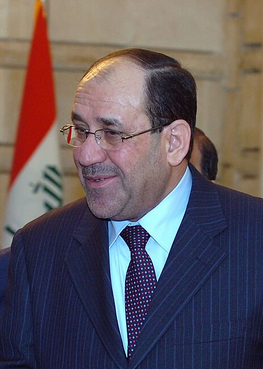Nouri al-Maliki
( politician) | ||||||||||||||||||||||||||||||
|---|---|---|---|---|---|---|---|---|---|---|---|---|---|---|---|---|---|---|---|---|---|---|---|---|---|---|---|---|---|---|
 | ||||||||||||||||||||||||||||||
| Born | نوري كامل محمد حسن المالكي 20 June 1950 Hindiya, Iraq | |||||||||||||||||||||||||||||
| Nationality | Iraqi | |||||||||||||||||||||||||||||
| Alma mater | University of Salahaddin | |||||||||||||||||||||||||||||
| Children | 5 | |||||||||||||||||||||||||||||
| Spouse | Faleeha Khalil | |||||||||||||||||||||||||||||
| Party | Islamic Dawa | |||||||||||||||||||||||||||||
Iraqi Prime Minister during the US occupation. "'I have a name for you,' the CIA officer said. 'Maliki'".
| ||||||||||||||||||||||||||||||
Nouri Kamil Muhammad-Hasan al-Maliki is an Iraqi politician. Leading the Islamic Dawa Party since 2007, he was Iraqi prime minister from 2006 to 2014 and Iraqi vice president from 2014 to 2015 and again from 2016 to 2018.
Career
Both during and after the American-led occupation of Iraq (2003–2011), al-Maliki worked closely with the Multi-National Force (MNF–I), and continued to cooperate with the United States following the withdrawal from Iraq.
During the occupation, he was appointed Prime Minister in 2006 by the occupation government.
Early in 2006, as the civil war grew fiercer, the American Ambassador in Baghdad, Zalmay Khalilzad, was summoned to a videoconference with President George W. Bush and Prime Minister Tony Blair, of the U.K. In parliamentary elections the previous December, a coalition of Shiite parties had won the most votes. But their nominee for Prime Minister, the incumbent, Ibrahim al-Jaafari, was struggling to form a government. An avuncular, bookish figure, Jaafari had infuriated Bush with his indecisiveness, amiably presiding over the sectarian bloodbath that had followed the recent bombing of a major Shiite shrine.
During the videoconference, Bush asked Khalilzad, "Can you get rid of Jaafari?"
"Yes," Khalilzad replied, "but it will be difficult."
For several day, Khalilzad worked to block Jaafari from securing a parliamentary majority, and finally he succeeded. But, as a condition for withdrawing quietly, Jaafari insisted that Iraq’s next Prime Minister come from his party, the Islamist group known as Dawa, which for five decades had fought tenaciously for Shiite interests. Ali al-Adeeb, a well-liked party official, seemed to be a logical candidate. But Khalilzad was troubled by Adeeb; his father was Iranian, and many Iraqis were already convinced that Iran secretly controlled their country. "He’s of Persian blood," Khalilzad said. "This is what they believe." Frustrated, Khalilzad turned to the C.I.A. analyst assigned to his office, a fluent Arabic speaker whose job was to know Iraq’s leaders. "Can it be that, in this country of thirty million people, the choice of Prime Minister is either Jaafari, who is incompetent, or Ali Adeeb, who is Iranian? Isn’t there anyone else?"
"I have a name for you," the C.I.A. officer said. "Maliki."
Within three months, Maliki had become Iraq’s Prime Minister.[1]
He was deposed in 2014, when Haider al-Ibadi was selected his successor.[2]
ISIS as proxy force
Former Prime Minister al-Maliki accused Saudi Arabia and Qatar of supporting ISIS during a France 24 television interview: "I accuse them of inciting and encouraging the terrorist movements. I accuse them of supporting them politically and in the media, of supporting them with money and by buying weapons for them."[3]
References
- ↑ https://www.newyorker.com/magazine/2014/04/28/what-we-left-behind
- ↑ https://www.globalresearch.ca/regime-change-in-iraq-standing-in-washingtons-way-why-obama-wants-maliki-removed/5396239
- ↑ https://www.washingtonpost.com/news/worldviews/wp/2014/10/06/behind-bidens-gaffe-some-legitimate-concerns-about-americas-middle-east-allies/